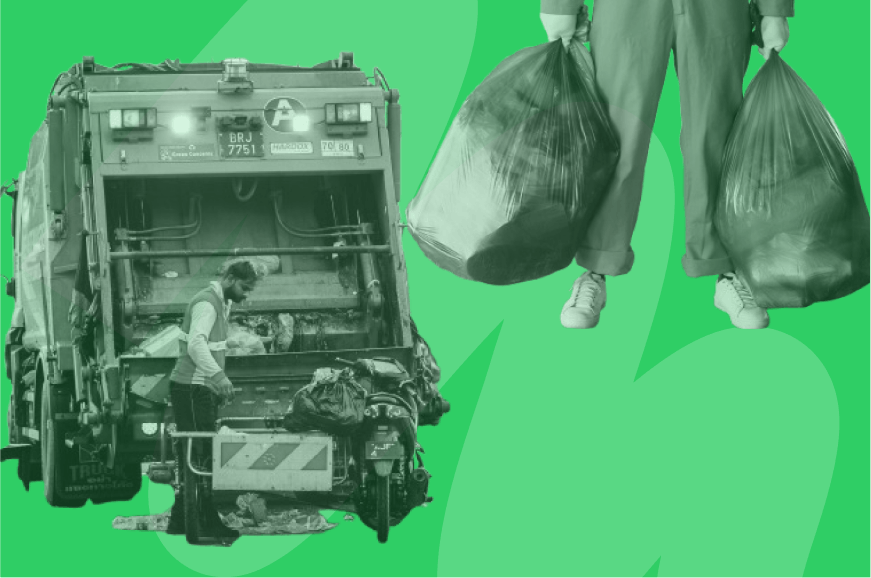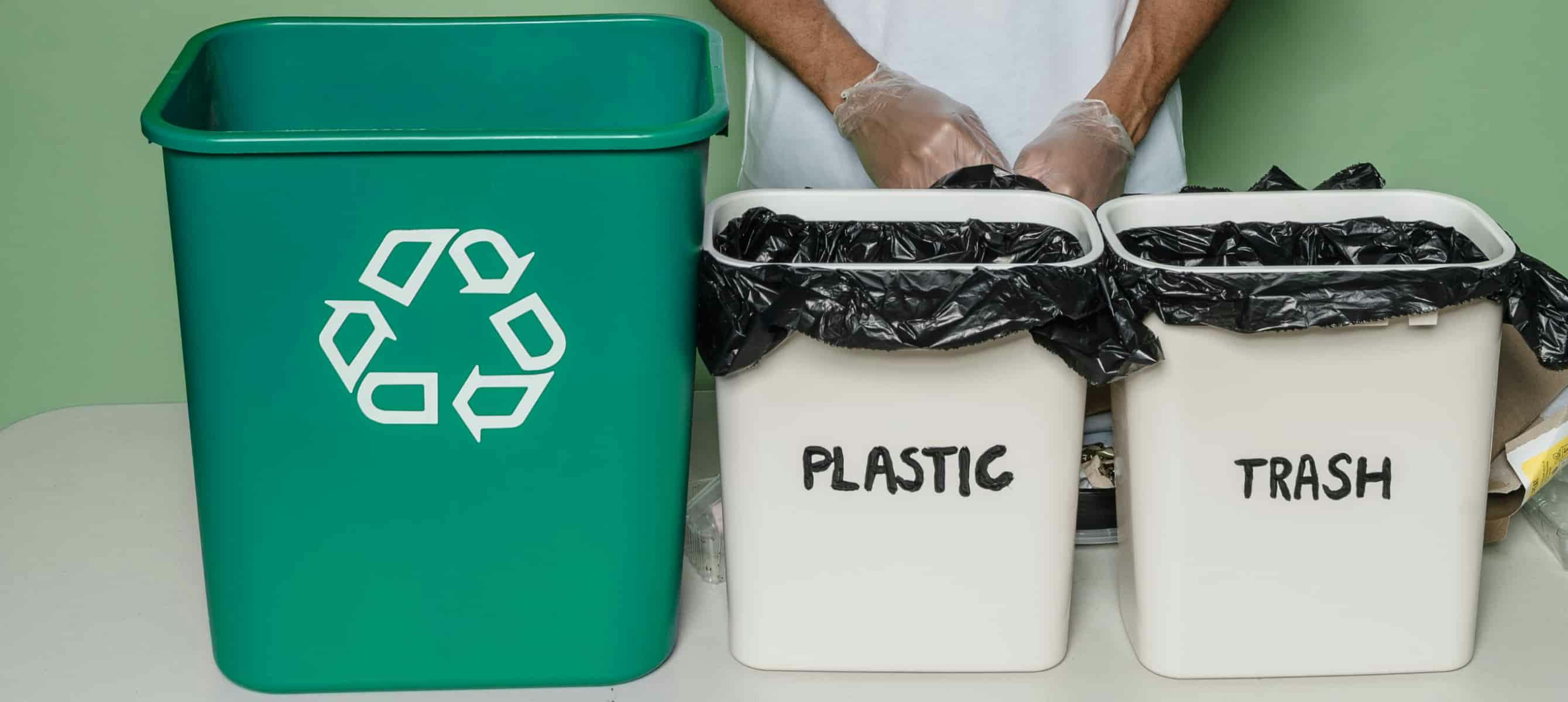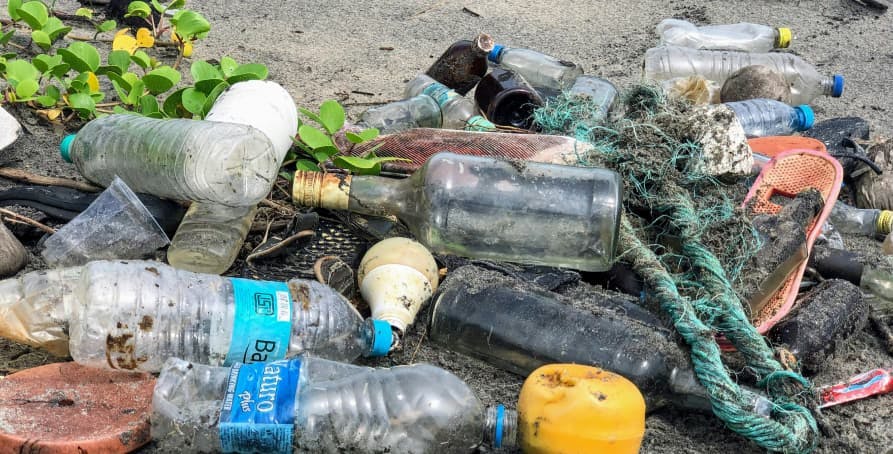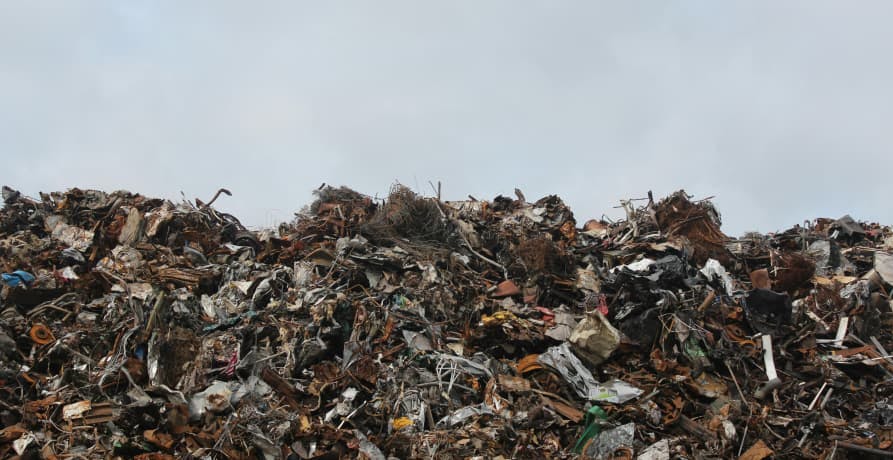ESG / CSR
Industries
Our guide to waste management



Waste management is something we rarely think about - yet it plays a fundamental role in keeping our cities clean, protecting our environment, and ensuring valuable resources don’t go to waste. Every year, the UK generates over 215 million tonnes of waste, from household rubbish and food scraps to industrial materials and electronic waste. How this waste is handled can have far-reaching consequences for both the planet and public health.
Over the past few decades, the UK has made significant progress in waste management, with recycling rates improving and policies shifting towards a more circular economy. But challenges remain. Landfills are still in use, plastic pollution persists, and businesses and households alike struggle to navigate complex recycling rules. Understanding the UK’s waste management system is key to making informed choices, whether you’re an individual looking to cut down on waste or a business aiming to improve sustainability practices.
In this guide, we’ll explore the UK’s approach to waste management, covering key regulations, challenges, and future innovations. We’ll also look at the role of businesses and consumers in creating a more sustainable waste system.
The importance of effective waste management
In the UK, effective waste management is critical for several reasons:
Protecting the environment
When waste isn’t handled properly, it can pollute the air, soil, and water. Landfills release methane - a potent greenhouse gas - while plastic waste clogs rivers and oceans, harming wildlife. Incineration, if not done efficiently, can also contribute to air pollution. A well-managed waste system ensures that as much material as possible is recycled or reused, reducing the need for landfills and incineration.
Conserving resources
Many of the materials we throw away - plastic, metal, glass, and paper - can be reused or recycled into new products. Effective waste management ensures these materials stay in circulation rather than being wasted. Recycling aluminium, for example, uses 95% less energy than producing new aluminium from raw materials. The same principle applies to paper, glass, and many other everyday materials.
Reducing costs and boosting the economy
A well-functioning waste management system isn’t just good for the planet, it also makes financial sense. Recycling and waste treatment industries create jobs, while businesses that embrace waste reduction strategies often see cost savings. According to a report from WRAP (Waste and Resources Action Programme), improving resource efficiency could save UK businesses £23 billion annually.
Improving public health
Poor waste management can have direct consequences for human health. Uncollected waste attracts pests, contaminates water supplies, and increases the risk of disease. In cities, overflowing bins and illegal dumping contribute to air and soil pollution. By ensuring waste is properly collected, sorted, and processed, local authorities can help protect public health and improve quality of life.
Meeting legal and sustainability commitments
The UK has committed to reducing waste and increasing recycling rates in line with both national and international targets. The government’s Resources and Waste Strategy aims to eliminate avoidable waste by 2050, while the Environment Act 2021 includes legally binding targets for waste reduction and resource efficiency. Businesses and individuals alike are being encouraged, and in some cases, required, to rethink how they dispose of waste.
The regulatory framework governing waste management in the UK
The UK has a well-established legal framework for waste management, designed to minimise environmental harm, promote recycling, and encourage businesses and individuals to take responsibility for the waste they generate. These regulations have evolved over time, reflecting the country’s shift towards a more sustainable and circular economy.
Here’s a breakdown of the key laws and policies shaping waste management in the UK:
| Regulation | Key Provisions | Impact |
|---|---|---|
| Environmental Protection Act 1990 |
- Establishes the ‘duty of care’ for waste management. - Categorises waste into household, commercial, and industrial. - Assigns local authorities waste management responsibilities. |
- Ensures responsible waste handling to prevent environmental and health risks. - Sets the foundation for modern waste laws. |
| Waste (England and Wales) Regulations 2011 |
- Implements the EU Waste Framework Directive. - Introduces the waste hierarchy (prevention, reuse, recycling, recovery, disposal). - Requires businesses to separate recyclables and manage waste responsibly. |
- Encourages sustainable waste practices. - Still in effect post-Brexit, with potential updates expected. |
| The Environment Act 2021 |
- Sets legally binding waste reduction targets. - Introduces Extended Producer Responsibility (EPR). - Establishes a Deposit Return Scheme (DRS). - Bans or restricts certain single-use plastics. |
- Shifts waste disposal costs to producers. - Aims to boost recycling rates and reduce plastic waste. |
| Landfill Tax & Financial Incentives |
- Landfill Tax (1996) discourages landfill use. - Plastic Packaging Tax (2022) applies to plastic packaging with <30% recycled content. - Producer responsibility schemes for industries like electronics and packaging. |
- Encourages recycling and resource recovery. - Creates financial incentives for sustainable packaging. |
| Local Authority Responsibilities |
- Responsible for household waste collection and recycling. - Operate recycling centres and waste disposal facilities. - Enforce waste regulations (e.g., fly-tipping fines). |
- Regional variations exist, but standardisation of recycling collections is planned. |
1. Environmental Protection Act 1990
This landmark legislation provides the foundation for modern waste management in the UK. It introduced the concept of the ‘duty of care’, which requires businesses and individuals to handle waste responsibly. Under this law, anyone producing, storing, transporting, or disposing of waste must ensure it does not cause harm to human health or the environment.
The Act also established the framework for controlled waste, dividing waste into categories such as household, commercial, and industrial waste. It also gave local authorities responsibility for managing municipal waste.
2. Waste (England and Wales) Regulations 2011
These regulations brought the EU Waste Framework Directive into UK law and introduced the waste hierarchy, which prioritises waste prevention, reuse, recycling, and recovery over disposal.
Under these rules, businesses must:
- Apply the waste hierarchy when disposing of waste.
- Separate recyclable materials such as paper, plastic, and glass.
- Ensure waste is stored, transported, and processed responsibly.
These regulations remain in place post-Brexit, though the UK government has signalled potential updates to align with its evolving waste strategy.
3. The Environment Act 2021
As one of the most significant environmental laws in recent UK history, the Environment Act 2021 sets legally binding targets for waste reduction and resource efficiency. Key measures include:
- The introduction of Extended Producer Responsibility (EPR), which shifts the cost of waste disposal from taxpayers to producers.
- A Deposit Return Scheme (DRS) for plastic bottles and drinks cans to encourage recycling.
- Powers to ban or restrict certain single-use plastics.
This Act is central to the UK’s long-term strategy for reducing waste and increasing recycling rates.
4. The Landfill Tax and other financial incentives
The UK government has used financial mechanisms to discourage landfill use and encourage recycling. The Landfill Tax, introduced in 1996, imposes a fee on waste sent to landfill, making it more cost-effective for businesses to recycle and recover materials.
Other financial measures include:
- Plastic Packaging Tax (2022): Applies to plastic packaging that contains less than 30% recycled content.
- Producer responsibility schemes: Require companies in industries such as electronics and packaging to contribute towards waste collection and recycling.
5. Local authority responsibilities
Local councils play a crucial role in UK waste management. They are responsible for:
- Household waste collection and recycling services.
- Operating waste disposal facilities such as recycling centres.
- Enforcing waste regulations, including fines for fly-tipping and improper waste disposal.
Each council sets its own recycling policies, leading to some regional variations in waste collection services. However, the government has committed to standardising household recycling collections across the country in the coming years to improve efficiency.
How these regulations impact businesses and individuals
For businesses, compliance with UK waste regulations is not optional, failure to properly manage waste can result in fines or legal action. Companies must:
- Keep waste to a minimum by following the waste hierarchy.
- Ensure waste is stored and transported safely, using registered waste carriers.
- Maintain records of waste disposal to demonstrate compliance.
For households, the main obligations involve sorting waste correctly for recycling and following local council rules on bin collections. The introduction of new deposit return schemes and producer responsibility laws will likely shift more responsibility onto manufacturers and retailers in the near future.
Key strategies and initiatives
The UK government has implemented a range of strategies and initiatives aimed at reducing waste, increasing recycling rates, and promoting a circular economy. These policies are designed to ensure that both businesses and households take responsibility for the waste they generate, while also encouraging innovation in waste reduction and resource efficiency.
Here are some of the key strategies shaping waste management in the UK:
| Regulation | Key Provisions | Impact |
|---|---|---|
| Resources and Waste Strategy for England (2018) |
- Aims to transition to a zero avoidable waste economy by 2050. - Standardises recycling collections across England. - Introduces Extended Producer Responsibility (EPR). - Phases out single-use plastics. - Targets a 50% reduction in food waste by 2030. |
- Improves recycling consistency. - Shifts waste disposal costs to producers. - Reduces plastic pollution and food waste. |
| Waste Prevention Programme for England (2021) |
- Focuses on reducing waste at its source. - Encourages eco-design and sustainable business models. - Promotes consumer awareness campaigns. |
- Embeds waste prevention into daily life. - Encourages businesses to adopt circular economy principles. - Reduces waste generation and promotes reuse. |
| Extended Producer Responsibility (EPR) |
- Makes producers financially responsible for the full lifecycle of their products. - Encourages better product design for recyclability. - Initially applies to packaging but will expand to textiles, electronics, and batteries. |
- Shifts waste management costs from taxpayers to producers. - Encourages sustainable product design. - Supports a circular economy. |
| Deposit Return Scheme (DRS) for Drinks Containers |
- Introduces a deposit scheme for plastic and glass drink containers. - Consumers pay a deposit, refunded upon returning the container. - Expected implementation in 2027. |
- Reduces littering. - Increases recycling rates of drinks containers. - Encourages sustainable packaging design. |
| Local Authority Waste Collection Reforms |
- Aims to standardise waste collection across England. - Introduces weekly food waste collections. - Implements restrictions on landfill waste. |
- Reduces confusion and inefficiencies in waste collection. - Encourages alternative waste disposal methods. - Aligns England with Scotland and Wales' waste policies. |
| Simpler Recycling: New Workplace Recycling Rules (2025) |
- Requires businesses, schools, and public sector organisations to separate recyclables. - Key categories: plastic, metal, glass, paper, and food waste (if >5kg per week). - Multi-tenant landlords must provide recycling facilities. - Micro-businesses have until 2027 to comply. |
- Standardises workplace recycling. - Reduces landfill waste. - Aligns business recycling with household standards. |
1. Resources and Waste Strategy for England (2018)
This strategy outlines the UK government’s long-term approach to waste management, aiming to transition the country towards a zero avoidable waste economy by 2050. The key objectives of this strategy include:
- Improving recycling consistency: Many local councils have different recycling policies, which can cause confusion. The government aims to standardise collections across England to make recycling easier for households and businesses.
- Encouraging producers to take responsibility: Through Extended Producer Responsibility (EPR), manufacturers will have to cover the full cost of recycling and disposing of their products.
- Phasing out single-use plastics: Several single-use plastic items, such as plastic straws and stirrers, have already been banned, with further restrictions expected in the coming years.
- Reducing food waste: The strategy sets a target to cut food waste in half by 2030, in line with the United Nations Sustainable Development Goals (SDGs).
Similar strategies have been developed for Scotland, Wales, and Northern Ireland, each tailored to the specific waste management challenges of those regions.
2. Waste Prevention Programme for England (2021)
This programme focuses on reducing waste at its source, rather than simply managing it once it has been created. It encourages:
- Eco-design: Promoting the development of products that are more durable, repairable, and recyclable.
- Sustainable business models: Encouraging companies to shift from selling products to offering services (eg. leasing instead of selling electronics).
- Consumer awareness campaigns: Educating the public on how to reduce waste, reuse items, and recycle correctly.
The goal is to embed waste prevention into everyday life, ensuring that businesses and consumers make smarter choices about the products they buy and dispose of.
3. Extended Producer Responsibility (EPR)
One of the most significant upcoming changes in UK waste management is the Extended Producer Responsibility (EPR) for packaging scheme, set to replace the existing packaging waste regulations. This policy aims to:
- Make producers pay for the full lifecycle of their products, including waste management costs.
- Encourage better product design to make items easier to recycle or reuse.
- Shift financial responsibility away from taxpayers and onto manufacturers.
EPR will first apply to packaging, but it is expected to expand to other product categories such as textiles, electronics, and batteries in the future.
4. Deposit Return Scheme (DRS) for drinks containers
The UK government has committed to introducing a Deposit Return Scheme (DRS) for plastic and glass drink containers. Under this scheme, which is expected to come into effect in 2027, consumers will pay a small deposit when purchasing a drink, which they can reclaim by returning the empty bottle or can to a collection point.
The scheme aims to:
- Reduce the littering of plastic bottles and cans.
- Increase recycling rates of drink containers.
- Encourage manufacturers to design more recyclable packaging.
5. Local authority waste collection reforms
Currently, waste collection varies significantly between different local councils, leading to confusion and inefficiencies. The government plans to introduce consistent waste collection rules across England, including:
- Weekly food waste collections for all households.
- Standardised recycling collections to simplify the process for residents.
- Restrictions on certain types of waste sent to landfills, encouraging alternative disposal methods.
Wales and Scotland have already made greater strides in standardising waste collection, and England is now working towards similar reforms.
6. Simpler Recycling: New Workplace Recycling Rules (2025)
From 31 March 2025, all businesses, schools, and public sector organisations in England will be required to separate recyclable waste into distinct streams, aligning with household recycling standards.
Key requirements:
- Workplaces must separately collect:
- Plastic, metal, and glass.
- Paper and card.
- Food waste (if producing over 5kg per week).
- Landlords of multi-tenant offices are responsible for providing recycling facilities.
- Micro-businesses (fewer than 10 employees) have until March 2027 to comply.
The goal of this policy is to standardise recycling, reduce landfill waste, and ensure businesses contribute to England’s circular economy goals.
The impact of these initiatives
The UK’s waste strategies and policies are already driving change:
- Recycling rates have improved, with household recycling reaching around 44% in England and higher rates in Wales (67%) and Scotland (62%).
- Plastic waste is being tackled, with bans on microbeads, plastic straws, and other single-use plastics.
- Businesses are taking greater responsibility, with major retailers and manufacturers committing to reducing waste and using more recycled materials.
Current waste management practices in the UK
Waste management in the UK involves a combination of household waste collection, commercial and industrial waste management, and hazardous waste disposal. Local authorities, private companies, and government policies all play a role in ensuring waste is handled in a way that reduces environmental impact while maximising resource recovery.
However, the effectiveness of waste management varies across different waste streams, and despite progress, the UK still faces challenges in improving recycling rates, reducing landfill use, and tackling waste crime.
Household waste management
Local councils are responsible for collecting and processing household waste, with services varying across regions. Most homes in the UK separate waste into:
- General waste (non-recyclables) – Typically sent to landfill or energy-from-waste incineration.
- Dry recycling (plastics, paper, metals, and glass) – Collected separately for processing at recycling facilities.
- Food waste – Some councils collect food waste separately for anaerobic digestion, which converts it into biogas and fertiliser.
- Garden waste – Often composted or processed into soil products.
Recycling rates and challenges
The UK has made significant progress in increasing recycling rates, but the system still faces several challenges.
- Confusing rules: Recycling guidelines vary between councils, leading to contamination and inefficiency.
- Plastic waste issues: Many plastic products are difficult to recycle due to mixed materials and lack of infrastructure.
- Limited food waste collections: Not all councils provide separate food waste bins, which contributes to unnecessary landfill waste.
To address these issues, the UK government is introducing standardised waste collection rules across England in the coming years to simplify recycling and improve consistency.

Commercial and industrial waste
Businesses and industries generate a significant amount of waste - often far more than households (61% vs 39%). Under UK law, businesses are responsible for managing their own waste and must:
- Follow the waste hierarchy to prioritise reduction, reuse, and recycling.
- Use licensed waste carriers for collection and disposal.
- Keep detailed waste records to prove compliance with regulations.
How businesses are tackling waste
Many businesses are adopting more sustainable waste practices, particularly as regulations tighten and consumers demand greener policies. Examples include:
- Supermarkets reducing plastic packaging and switching to compostable alternatives.
- Restaurants and food manufacturers donating surplus food to charities instead of discarding it.
- Retailers offering take-back schemes for products like clothing, electronics, and batteries.
Despite improvements, commercial waste recycling rates remain lower than household recycling rates, and many businesses still struggle to fully implement waste reduction strategies.

Hazardous waste management
Certain waste materials require special handling and disposal due to their potential to harm human health and the environment. This includes:
- Electronic waste (e-waste): Phones, laptops, and batteries, which contain toxic materials like lead and mercury.
- Industrial chemicals: Used in manufacturing, agriculture, and construction.
- Medical waste: Includes pharmaceuticals, syringes, and biological waste from hospitals.
How the UK handles hazardous waste
- Businesses must separate hazardous waste from general waste and use licensed disposal facilities.
- Local councils provide e-waste recycling services, ensuring materials like lithium and rare metals can be recovered.
- The UK government has introduced strict landfill bans on hazardous materials, encouraging safe treatment and disposal.
Despite these measures, illegal waste dumping (fly-tipping) remains a serious issue, particularly for hazardous materials. The UK Environment Agency continues to crack down on waste crime, which costs the economy an estimated £1 billion annually.

Landfill and energy-from-waste (EfW) facilities
While the UK has reduced landfill use significantly, some waste streams still rely on landfilling or incineration.
- Landfill use has declined due to the Landfill Tax, which makes disposal costly for businesses.
- Energy-from-waste (EfW) plants now process millions of tonnes of waste annually, generating electricity from non-recyclable waste.
There are concerns, however, about the long-term sustainability of waste-to-energy facilities:
- Environmental impact – While cleaner than landfills, EfW still produces CO2 emissions.
- Over-reliance on incineration – Critics argue that too much waste is incinerated instead of being recycled.
What’s next for UK waste management?
- Standardised recycling collections will make it easier for households to recycle correctly.
- Businesses will face more responsibility for their packaging waste under new Extended Producer Responsibility (EPR) laws.
- Deposit Return Schemes (DRS) for plastic bottles will launch in 2027 to increase recycling rates.
While the UK has made great strides in waste management, challenges remain. The next decade will be crucial in improving recycling rates, reducing plastic waste, and shifting towards a truly circular economy.
How Greenly can help your company
Effective waste management is just one piece of the sustainability puzzle. To achieve long-term environmental goals, businesses need a comprehensive approach to carbon management, ensuring that their operations align with the UK’s sustainability targets and regulations.
At Greenly, we help companies measure, track, and reduce their carbon footprint - supporting businesses in their journey towards greater sustainability.
Our carbon management solutions
- Comprehensive carbon tracking – Our platform enables businesses to monitor their Scope 1, 2, and 3 emissions, identifying key areas for reduction.
- Lifecycle assessments (LCA) – We provide detailed insights into the environmental impact of products and services, helping businesses adopt eco-design principles and reduce waste.
- Sustainable supply chain strategies – Our data-driven approach helps companies select more sustainable suppliers and optimise waste management practices throughout their value chain.
- Regulatory compliance support – With tightening UK waste and carbon regulations, Greenly ensures that your company stays ahead of compliance requirements.
By integrating carbon management into your business strategy, you can not only reduce emissions but also cut costs, improve brand reputation, and meet increasing consumer and investor expectations for sustainability.
Would you like to learn more about how Greenly can support your company’s sustainability goals? Get in touch with us today.





